The SF State College of Ethnic Studies is honored to be the host campus for the California State University (CSU) Council on Ethnic Studies (CES), an alliance of all ethnic studies-focussed departments, programs and faculty across our twenty-three campuses. The Council is a collaborative forum for addressing the varied needs on each campus – both those with fully established departments as well as those in the process of developing new ethnic studies programs and curricula. Membership is available to all CSU faculty currently teaching in CSU Ethnic Studies departments or units.
Steering Committee Faulty
Between the twice-annual meetings, Council business is coordinated by a Steering Committee, currently comprised of the following faculty:
| Name | Location |
|---|---|
| Melina Abdullah | Los Angeles |
| Scott Andrew | Northridge |
| Teresa Carrillo | San Francisco |
| Linda Espana Maram | Long Beach |
| Maulana Karenga | Long Beach |
| Kenneth Monteiro, Chair | San Francisco |
| Boatamo Mosupyoe | Sacramento |
| Marcos Pizarro | San Jose |
| Craig Stone | Long Beach |
For further information on the Council, please email Contact Kenneth Monteiro.
Purpose of CSUCES
The purpose of The California State University Council on Ethnic Studies (CSUCES) is to:
For the purpose of this Council's focus, "Ethnic Studies" is not conceived as being synonymous with all studies or topics about race or ethnicity. It refers to studies or topics which (1) address the resistance and liberation struggles based on race or ethnicity, (2) center themselves through the lens of those studied, not just as object, but as agents within the study or topic, (3) promotes the well-being of the people, (4) empowers the people to achieve their self-defined aspirations, and (5) can be used to improve the lives of the people studied.
A. Advance the discipline(s) of Ethnic Studies with focus on sharing and diffusion of the knowledge and critical understanding of the histories, cultures, intellectual traditions, lived-experiences, and social struggles of the four historically racialized core ethnic groups: Native Americans, African Americans, Asian Americans and Latina/o Americans;
B. Establish academic and professional standards to define the parameters of the discipline and to guide teaching, research, assessments, self-study, concepts of multicultural education, and modes of community and public engagement;
C. Promote research, study, teaching, learning, scholarly exchange, curriculum design, multicultural quality education, publication, and professional development of faculty and students in the discipline;
D. monitor and support the status, viability, well-being, and sustainability of Ethnic Studies units in the academia and,
E. Link scholarship, teaching, learning, and community and public engagement through advocacy, activism, policy development, ongoing community capacity-building and involvement with issues, institutions organizations, and movements concerned with building strong, self-affirming and resilient communities, a just and equitable multicultural society, and a good and sustainable world.
Resources
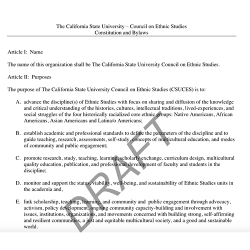
Draft CSUCES Constitution Document
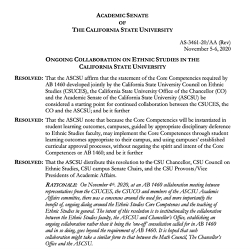
Academic Senate of the CSU Resolution: Ongoing Collaboration on Ethnic Studies in the California State University Resolved
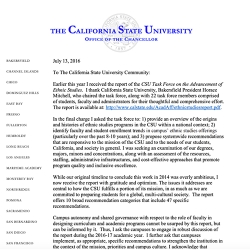
CSU Task Force on the Advancement of Ethnic Studies
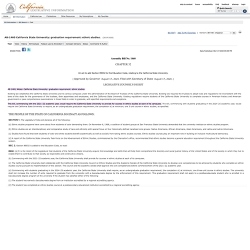
Weber Bill AB1460 Requiring Ethnic Studies in the CSU
Status: passed and approved by the Governor August 17, 2020
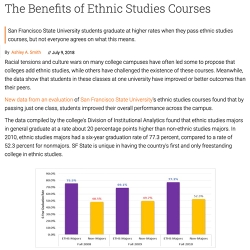
The Benefits of Ethnic Studies Courses
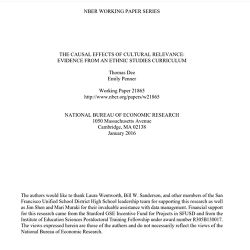
The Causal Effects of Cultural Relevance: Evidence From an Ethnic Studies Curriculum
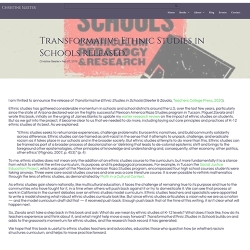
Transformative Ethnic Studies in Schools
Resolutions and Statements
Resolutions & Statements in Opposition to Chancellor White’s Title V Changes to GE & the Implementation of AB1460:
If your institution's or group's is not listed below, please send it to ralfonso@sfsu.edu for addition to the list. Thanking you in advance for your support.
Opposition to the CSU Board of Trustees' Changes to Title 5 and CSU Chancellor's Office Proposal for Implementing AB 1460
SU Academic Senate Opposition to the Chancellor's Office
AB 1460 Implementation Plan
CSUB App Box (Bakersfield Box Account needed to Access document)
Link to completed resolutions: CSUB senate resolutions
Resolution in Opposition to Chancellors Proposed Implementation of AB 1460
CSUCI Resolution in Opposition to the CSU Chancellor’s Proposed Implementation of AB 1460 PDF
Opposition to chancellors implementation of ethnic studies ab1460 final
Resolution in Opposition to the CSU Chancellor's Proposed Implementation of AB 1460
Resolution in Opposition to the Chancellor's (CO) Proposed Implementation of AB 1460
Fresnostate Resolution in Opposition to the CSU Chancellor’s Proposed Implementation of AB 1460 PDF
FU Resolution in Opposition to the CSU Chancellor's Proposed implementation of AB 1460
Fullerton Resolution in Opposition to the CSU Chancellor’s Proposed Implementation of AB 1460 PDF
Sense of the Senate Resolution on Opposition to Chancellor’s Proposed Process for Implementation of AB 1460 CSU Ethnic Studies Graduation Requirement
Resolution in Opposition to the CSU Chancellor's Proposed Implementation of AB 1460
Cal State LA Resolution In Opposition to CSU Chancellor’s Proposed Implementation of AB 1460 PDF
Ethnic Studies Resolution
CSUN Ethnic Studies Resolution In Opposition to Chancellors Proposed Implementation of AB 1460 PDF
CPP resolution opposition to CSU bot ab 1460 implementation signed
Resolution in Opposition to the Chancellor’s Proposed Process for Implementation of AB 14601 PDF
Ethnic Studies Senate Resolution-In Opposition to Chancellors Proposed Implementation of AB 1460
Resolution in Opposition to Title V Restructuring of General Education
SF STATE Resolution in Opposition to Title V Restructuring of General Education
SS-F20-3, Sense of the Senate Resolution, Opposing the Chancellor's Proposed Implementation of AB 1460
Resolution opposing the implementation of AB1460/ education code 89032 (the California State University (CSU) ethnic studies undergraduate graduation requirement) in general education
Cal Poly SLO RESOLUTION OPPOSING THE IMPLEMENTATION OF AB1460 PDF
Opposition to Implementation of AB1460
Adobe Acrobat Reader is required to view PDF files. This is a free program available from the Adobe web
site. Follow the download directions on the Adobe web site to get your copy of Adobe Acrobat Reader.
The documents on this website/webpage might not be fully accessible to persons with disabilities. We are working to
fix these accessibility barriers by the end of the year. If you have trouble in accessing this content, please contact (415) 338-1111 and we will provide you with accessible alternatives.